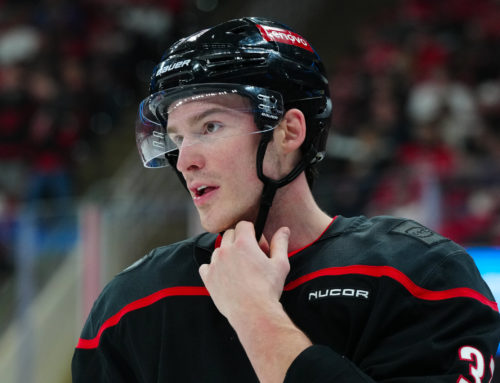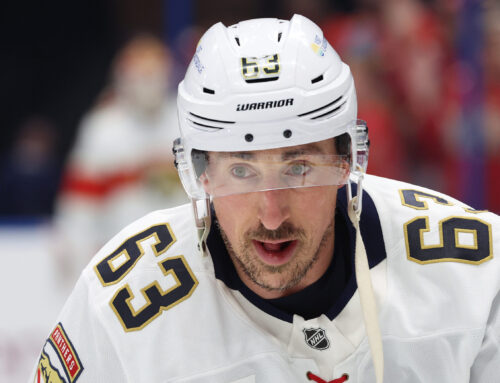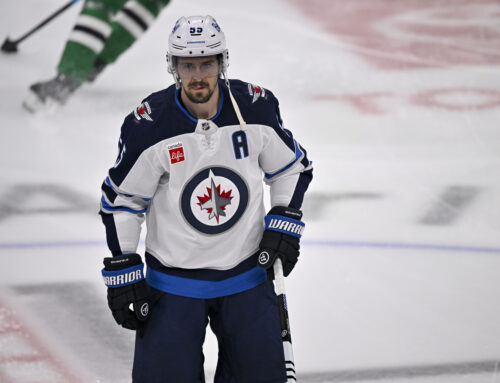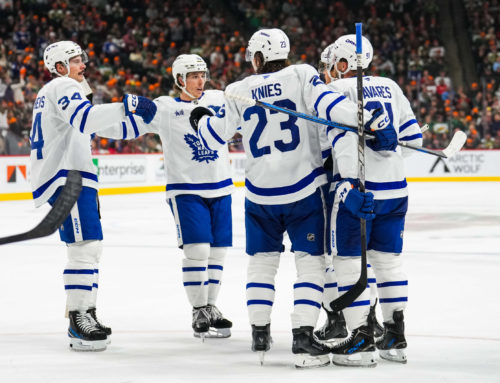
Don’t forget to pick up your copy of the Fantasy Guide, if you haven’t done so already. I seem to see quite a few questions around the site and on social media about point projections and potential upsides for specific players. The Fantasy Guide will answer those questions plus a whole lot more for you. Don’t waste any more time and pick up yours today. You’ll also have a chance to win a free Google Home!
Note to purchasers: All prices on the Dobber website are in US dollars.
*
Next week I’ll be updating the Top 100 Roto Rankings again. If you have any suggested changes for August, please let me know as soon as possible either below or on the Roto Rankings page itself. Remember, this is for multiple category leagues (beyond pure points) and only for single season.
In those rankings, I’m starting to come around to the idea that I may have Dustin Byfuglien (#77) ranked too low. I’m still concerned about injuries and overall wear and tear, as he has averaged only 55 games played over the last two seasons. However, the perceived value is still there. I wasn’t really expecting this, but I had multiple owners in my keeper league inquiring about trading for him. I did think long and hard about a Byfuglien deal, but in the end I wasn’t able to consummate a trade on my end that I was satisfied with. If he has another injury-filled season, then I’m going to regret not taking action. However, I’m perfectly fine with rolling the dice on him for one more season.
Not that fantasy owners usually put a ton of stock into playoff stats, but lost in the Jets’ disappointing first-round exit was the fact that Byfuglien had eight points (2g-6a) in the six-game series with St. Louis. Over the injury-shortened season, Byfuglien scored at a 0.74 PTS/GP pace, which was similar to the likes of Keith Yandle, Erik Gustafsson, Tyson Barrie, and John Klingberg. He also continued to average 24 minutes per game, which is a number that probably won’t decrease if you consider that the Jets have lost two 20+ minute defensemen in Jacob Trouba and Tyler Myers this offseason.
Big Buff is also a multicategory beast, as he should still be good for over 200 shots along with the power-play points that will go along with playing on the Jets’ first unit. The competitor in Byfuglien might disagree, but I’m wondering whether his hits and penalty minutes decrease as a result of the 34-year-old trying to preserve his career while the Jets’ window as a contender is still open. He would have been on pace for over 100 PIM for the fifth consecutive season had he played a full season, although his hits total has declined gradually to nearly one fewer hit per game than he would dish four seasons ago.
Byfuglien should no longer be considered a top-5 defenseman even in multicategory leagues, as age-related decline has already set in and there are other d-men that simply score more often than he does. That doesn’t mean he can’t be valuable to fantasy teams, provided that he isn’t drafted in the first 2-3 rounds as often happened over the past few seasons.
*
There seems to be a whole lot more confidence in the Canadiens this offseason than there was a year ago. A significant portion of that confidence has to do with the emergence of Max Domi after he was acquired for Alex Galchenyuk, a trade many had thought Arizona had won.
Domi was a pleasant surprise for fantasy owners as well as Habs’ fans, easily reaching career highs in both goals (28) and points (72). His 0.88 PTS/GP was comparable to the likes of Vladimir Tarasenko and Logan Couture as well as top-5 scoring defensemen Morgan Rielly and John Carlson. Domi also took over 200 shots for the first time in his career when he had never reached 160 shots in his previous three seasons. Overall, Domi seems to be a great fit in Montreal.
The main concerns with Domi maintaining a 70-point pace again is a career-high 13.8 shooting %, as well as an IPP of 75.8%. Domi’s shooting percentage over the previous two seasons in Arizona was 6.0% and 8.3%, so some regression from his 28 goals might be expected. If Domi takes roughly the same amount of shots with an 8% success rate, he will be looking at only 16 goals. That’s still better than the nine he scored in each of his two previous seasons in Arizona. As for the IPP, it had swung between 57% to 70% over three seasons in Arizona.
I wouldn’t expect a huge regression from Domi, since part of that success in Montreal could be from getting out from an offensively stagnant team in Arizona. However, I think you’ll be more satisfied with Domi this coming season if you expect around 60 points as opposed to 70 points.
*
A question made the rounds earlier this week about whether first-place teams and last-place teams should be allowed to make trades with each other. I say the question was making the rounds because I first saw it on Twitter with three options: 1) Yes 2) No 3) Only in a keeper league. Then I saw a similar topic being discussed in this article on making fantasy baseball trades. I agree with the statement author Fred Zinkie made in this article, although I’ll offer my half knee-jerk, half thought-out answer. After all, the general principles apply to fantasy hockey just as they would fantasy baseball or any other fantasy sport.
I have no problem with any team making trades with another, regardless of standings. In other words, I will not be adding a rule to any league in which I commish (I have two) where two teams cannot make a trade before the deadline. It’s the free market. Besides, what constitutes a bad trade? What constitutes a last-place team? Sometimes the answer is obvious; sometimes, not so much. The last-place owner may be playing to avoid the dishonor of finishing last, or he may be simply playing spoiler or for pride. Not all last-place owners have checked out of their teams, although you can understand why they won’t be putting the same amount of effort at that point as a contending owner.
What about unfair trades in which one team owner in last place dumps all his players to his friend who is competing for first (and who may be offering something in return that isn’t league currency, like a case of beer or good ol’ cash). That’s why you always include some sort of control in which trades can be vetoed, either by the league commish or by vote. In my 10 years of being a commish, I can only remember voting against one trade. And I believe that trade went through, even with my vote. There were a few other instances where an owner accused two others of collusion in the form of an unfair trade, but after using my own judgment on the deal I decided not to bite. In the leagues I participate in, I believe that all members participate within a reasonable level of common courtesy.
To Zinkie’s statement about not sending trade offers to owners that haven’t been paying attention, it’s a waste of time anyway. If I send a trade offer, I don’t want to wait a week and not receive a response. I know people have lives and can’t always get to trade offers immediately (you won’t get a response from me in five minutes, if you know me well enough), but I would at least expect some sort of response (yes, no, counteroffer, let me think about it) within a couple days.
That’s my take on the situation. I’m sure some of you have similar thoughts, or maybe something completely different. Feel free to share below.
*
For more fantasy hockey information, or to reach out to me directly, you can follow me on Twitter @Ian_Gooding.





 CAR
CAR FLA
FLA TOR
TOR DAL
DAL MTL
MTL T.B
T.B S.J
S.J BUF
BUF EDM
EDM
